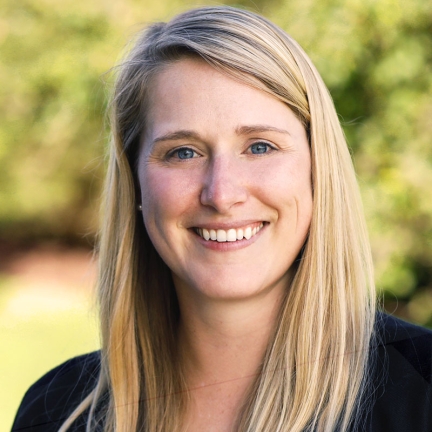Allison Jacobel
Assistant Professor of Earth and Climate Sciences

- Office
- McCardell Bicentennial Hall 426
- Tel
- (802) 443-3093
- ajacobel@middlebury.edu
- Office Hours
- Spring 2027: Mondays 9a-12p or by appointment
I earned my Ph.D. in Earth and Environmental Sciences at Columbia University and the Lamont-Doherty Earth Observatory, and was a Voss Postdoctoral Research Fellow at Brown University, where I also taught before arriving at Middlebury. I also hold a Visiting Scientist position at The University of Colorado at Boulder.
My teaching guides students as they explore Earth systems and their interactions using geochemical tools and datasets. My recent courses at Middlebury include Earth’s Oceans and Coastlines, How to Build a Habitable Planet, Earth’s Climate History, Sedimentary Processes & Environments, and I enjoy helping students strengthen their writing and professional preparedness in the Senior Thesis Research Seminar.
My research interests are united by three features: they 1) further our investigation of the coupled ocean-atmosphere system, 2) employ novel biogeochemical proxies and techniques and 3) help improve predictions of future climate change. The scientific questions I find most compelling go beyond reconstructing paleoclimate; they elucidate the underlying drivers and mechanisms of change in the climate system.
My approach to earth and climate science is grounded in the use of of marine sediments, organic biomarkers, and microfossils to reconstruct environmental conditions and processes. Specifically, my research toolbox includes radiogenic (U, Th, and Pa) and stable (O, C, and N) isotopes, trace element ratios (e.g.: B/Ca), elemental abundances (e.g.: xsBa), foraminiferal assemblages, and alkenone biomarkers. I use these tools to reconstruct features of ocean environments including temperature, salinity, circulation patterns, nutrients, primary productivity, carbon storage, and oxygen concentrations.
Please check out my website for recent publications and opportunities for student research” - use the password FOR@M on the “Opportunities for Students” to see available projects.
Courses Taught
ECSC 0161
Earth's Oceans and Coastlines
Course Description
Earth’s Oceans and Coastlines
In this course we explore our planet’s oceans and coastlines through the interdisciplinary study of marine geology, physics, biology, and chemistry. We use these fields as lenses through which we examine our reliance on the oceans for climate stability, food, economic resources, and waste dispersal, among a host of other ecosystem services. In parallel, we explore how humans are fundamentally altering coastal and marine ecosystems, posing unequally distributed, but increasingly severe threats to ocean and human health. In labs, we learn quantitative data visualization and analysis techniques making use of real-world observations and datasets.3 hrs. lect., 3 hrs. lab/field trips (formerly GEOL 0161)
Terms Taught
Requirements
ECSC 0302
Current
Climate and Earth's History
Course Description
Climate and Earth’s History
In this course we will discuss how external forces and internal feedbacks within the Earth system govern climate. Specific topics will include orbital variability, changes in ocean circulation, CO2 uptake in terrestrial ecosystems, and molecular vibrational controls on infrared absorption and Earth's heat budget. We will then examine climate change through Earth's history as evidenced by a number of geologic proxies including the sedimentary record, ice cores, isotopic records, glaciers, soils, and tree rings. Ultimately, our improved understanding of past climates will provide a context within which to discuss future changes to come. (ECSC 0202, or by waiver) 3 hrs. lect. (Formally GEOL 0302)
Terms Taught
Requirements
ECSC 0400
Senior Thesis Research Seminar
Course Description
Senior Thesis Research Seminar
In this seminar students will focus on methods and strategies for completing advanced research in earth and climate sciences, serving as preparation for capstone research experiences at the 700 level. Areas of emphasis include research methods, reading and synthesis of primary literature, data analysis, interpretation and visualization, and scientific writing. (ECSC 0201 or ECSC 0202) 3 hrs. sem. or lab.
Terms Taught
ECSC 0500
Current
Upcoming
Readings & Research
Course Description
Readings and Research
Individual or group independent study, laboratory or field research projects, readings and discussion of timely topics in earth and environmental science. (Approval only) (formerly GEOL 0500)
Terms Taught
ECSC 0700
Current
Upcoming
Senior Thesis Research
Course Description
Senior Thesis Research
Upon completion of ECSC 0400, all senior ECSC/GEOL majors will continue their independent senior thesis research by taking one unit of ECSC 0700. This research will culminate in a written thesis which must be orally defended. (Approval only) (formerly GEOL 0700)
Terms Taught
ECSC 0701
Current
Upcoming
Senior Thesis Research
Course Description
Senior Thesis Research
Optional second semester or Senior Work for students undertaking a full-year thesis project. (Approval only)
Terms Taught
GEOL 0340
Sedimentary Process&Environ
Course Description
Sedimentary Processes and Environments
This course examines modern sedimentary processes and environments, with the goal of understanding the environmental conditions under which ancient sediments were deposited and preserved. Topics include the dynamics of weathering and sediment transport; the interpretation of depositional environments from sedimentary textures, structures and relationships; and stratigraphic techniques for interpreting Earth history. Field trips provide hands-on opportunities to apply course material and investigate Middlebury’s ancient history as a sandy, tropical paradise. (Any 0100-level geology course or by waiver) (formerly GEOL 0241) 3 hrs. lect., 3 hrs. lab/field trips
Terms Taught
Requirements
GEOL 0500
Readings And Research
Course Description
Readings and Research
Individual or group independent study, laboratory or field research projects, readings and discussion of timely topics in earth and environmental science. (Approval only)
Terms Taught
GEOL 0700
Senior Thesis Research
Course Description
Upon completion of GEOL 0400, all senior geology majors will continue their independent senior thesis research by taking one unit of GEOL 0700. This research will culminate in a written thesis which must be orally defended. (Approval only)
Terms Taught
